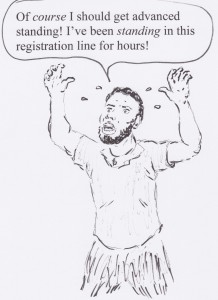I always hated scripts where somebody gets killed off and the writer gives you a petty reason not to feel too badly for them (I think of one movie where the victim was just vulgar, or another where she was just divorced, etc.). The very act of characterizing the person in some way makes them more identifiably human, and makes my heart go out to them more. (That may be one reason why I don’t watch many movies; when I do watch them I get into them too much.) Every life is precious, and most offenses are not capital (deathworthy) ones—or at least not any more than the sort that we all commit.
So in noting an irony or two surrounding Rachel’s death in Genesis, I am in no way suggesting that she merited her death. (By the time Genesis ends, everybody significant in the book except God has died anyway.) I am simply noting possible literary connections and trying to probe what they mean.
In 35:16-20, Rachel dies in childbirth. This person who dies in childbirth is the same person who earlier demanded of her husband, “Give me children or I will die!” (30:1). Possibly whatever biological issues that made it difficult for her to have children to begin with also led to her death in childbirth, though such death in childbirth was unfortunately common back then. But the narrative connection may also show us how important having children was to Rachel; she preferred death to not having children, and she ultimately did give her life in the process.
Another possible, though less clear connection, comes in ch. 31. Rachel steals her father’s teraphim, probably meaning idols and possibly connected with inheritance rights. Jacob, unaware that Rachel has stolen them, indignantly declares that if Laban finds his teraphim with anyone, that person would not live (31:32). In this case, therefore, Jacob deems this theft a potentially deathworthy offense. Concerned to avoid being detected as the thief, Rachel seats herself on her father’s teraphim, and avoids rising before her father by appealing to the “way of women” (31:35). This undoubtedly means menstruation; given ancient Near Eastern custom, Laban would not wish to touch her in this state, nor would he assume that in this condition she would be sitting on his gods!
But the language of women’s “way” might also evoke pregnancy. In her next pregnancy, Rachel would in fact die. The connection here is less clear, however, both because the “way of women” does not specify pregnancy and also because Rachel probably had recently already surrendered the teraphim when Jacob (presumably by now knowing of the theft) buried all the foreign gods among them (35:4).
A surer connection is simply an echo of the suffering attached to childbirth from the beginning. As Jacob had slaved in the fields for Laban (31:38-41), enduring the hard labor that became humanity’s lot after their inaugural disobedience (3:17-19), so Rachel died in the pangs of childbirth that had befallen humanity at the same time (3:16). That is, although we could identify some sins committed by Rachel or other characters in Genesis, we cannot assume that Rachel was more sinful than others or being punished for her personal sin. (We don’t read in Genesis about any painful death for Esau, for example.) As Jesus pointed out with regard to some recent particularly abrupt deaths, those victims were no worse than others, and all people will face a fate no less horrible if they do not repent (Luke 13:2-5).
What the irony may do is portend (for the hearer who knows the full story) and thus draw attention to her death, thereby increasing the pathos and inviting greater sympathy for this matriarch of Israel. Whatever the possible factors in her death, the account’s ancient Israelite audience would look on Rachel as the ancestor of two of their tribes (three if one counts Ephraim and Manasseh separately).
Clearly their ancestors in Genesis were imperfect humans, whether we think of Jacob or of Simeon and Levi or Judah. Yet God was with these imperfect people, and Rachel’s sacrifice helped make possible their existence as a people, thus qualifying her retroactively as a matriarch in Israel (cf. Ruth 4:11). This observation in turn reminded Genesis’s first audience, and reminds us as well, that God continues to work with imperfect people, so long as we are willing to be shaped by this perfect God. What God can make eternally of the sacrifices we offer in our often ordinary-looking lives is something that will be seen most fully from the vantage point of eternity. Yet God is trustworthy in making these offerings count as part of the larger story he is weaving in history.
(This study continues a series on Genesis. See e.g., God’s favor; Abraham’s promise; Babel.)



